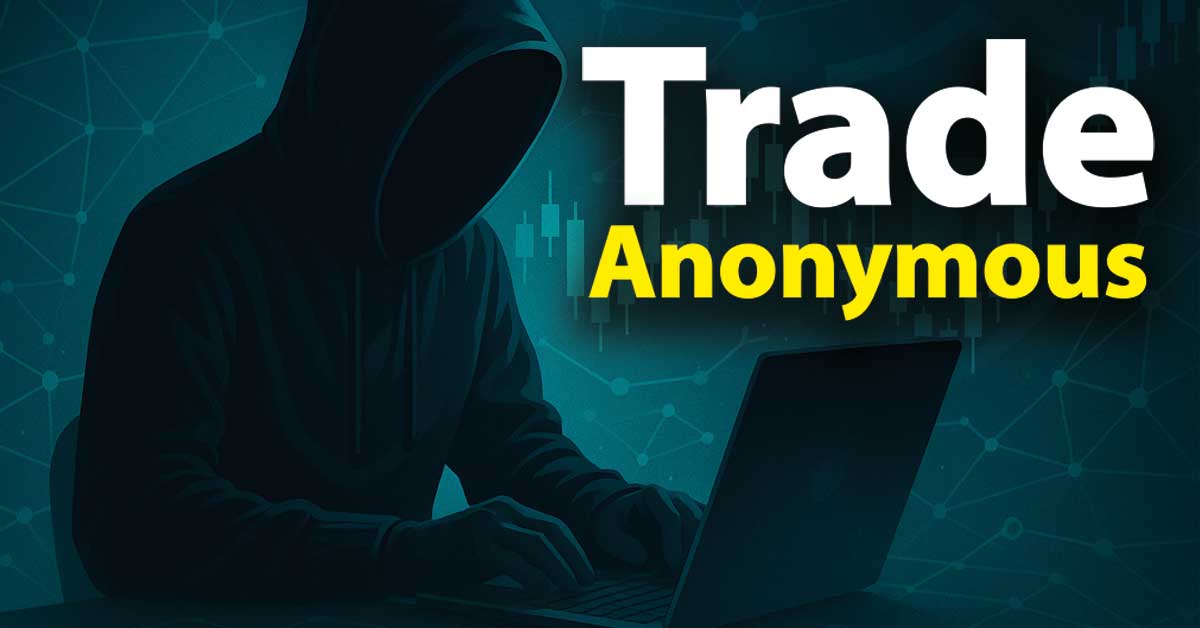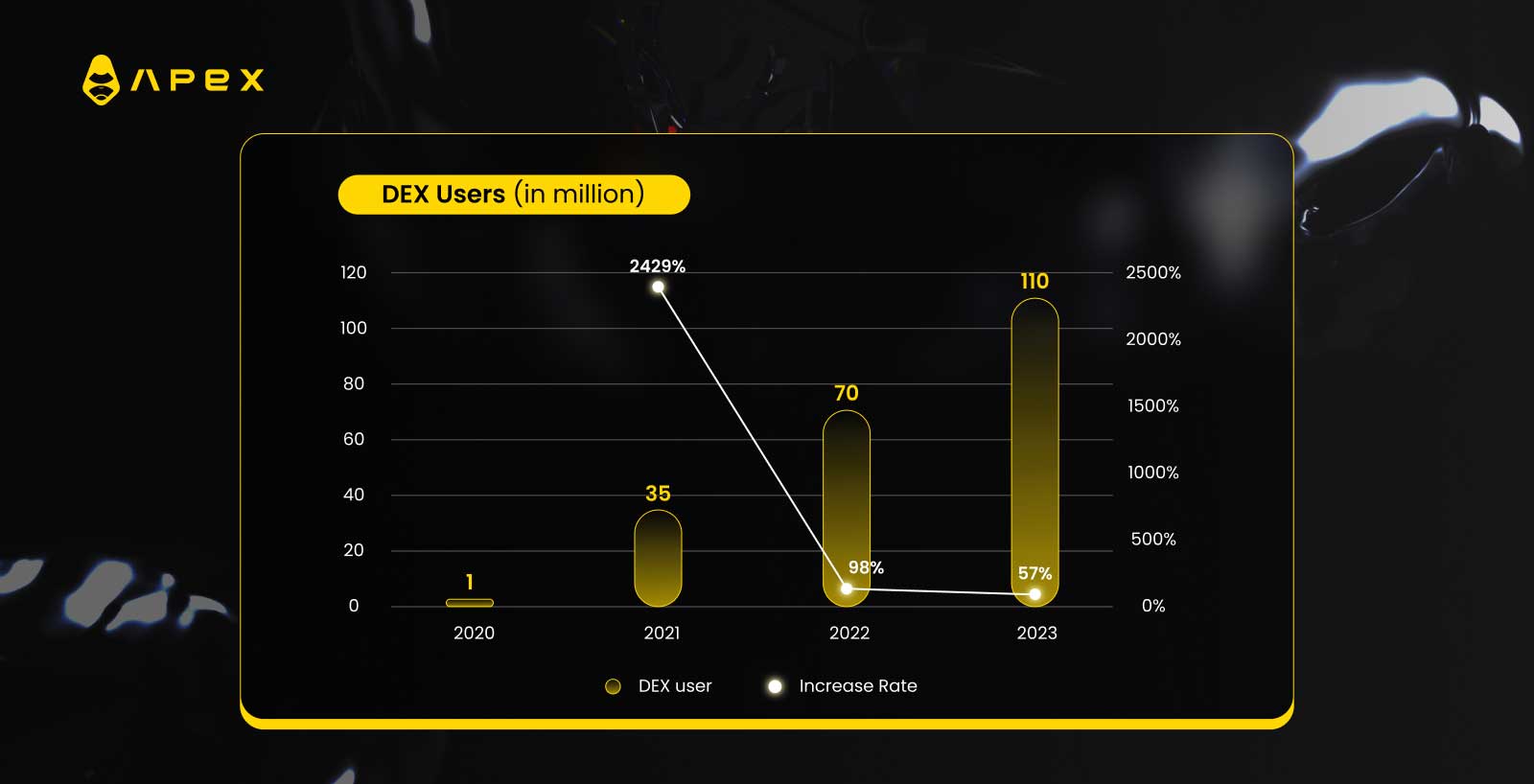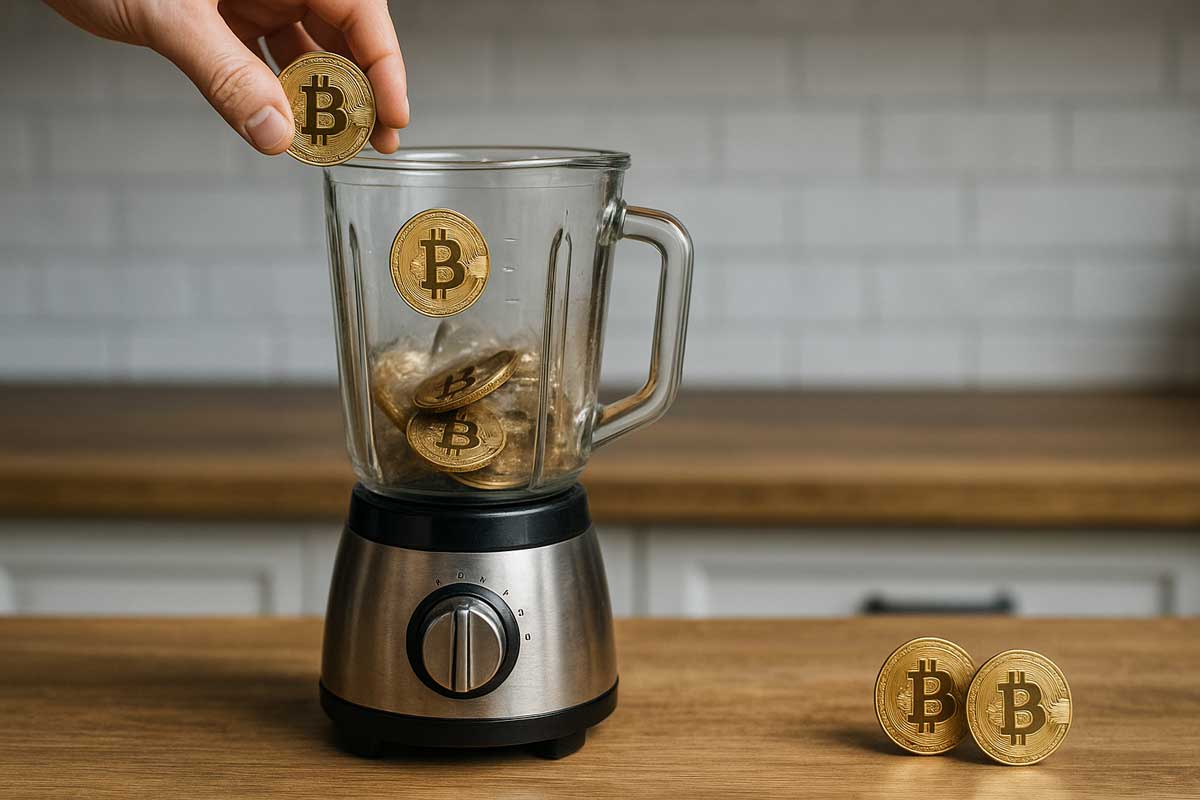How to Trade Anonymously (Legally) in Crypto

Trading crypto without revealing your identity is not just possible, it’s becoming increasingly popular. Many traders are looking for ways out of traditional KYC (Know Your Customer) requirements due to concerns about privacy, identity theft, or regulatory overreach in their home countries.
While anonymity in crypto is often misunderstood, it’s important to know that trading anonymously doesn’t mean breaking the law. There are fully legal ways to protect your privacy when buying, selling, or holding digital assets. That said, always consider your personal situation, respect your local regulations, and do your own research.
In this article, we’ll explore the best legal methods to trade crypto anonymously, whether you're privacy-focused, live in a restricted region, or just want more control over your personal data.
Short on time?
Skip ahead and start trading now by connecting your wallet to Apex Omni, a decentralized exchange that requires no KYC.
And increase your privacy using a VPN like NordVPN.
Why Trade Anonymously?
There are several valid reasons why traders choose to trade crypto anonymously. Below are some of the most common and important motivations:
Privacy Concerns
In recent years, there have been numerous cases of crypto exchanges suffering data breaches or hacks, exposing sensitive user information. Leaked data, such as phone numbers, email addresses, and even home addresses, often ends up on the dark web, where it’s used in scams, phishing attacks, or identity theft.
For traders in certain countries with higher levels of crime or corruption, having personal information out in the open can pose serious safety risks. While KYC (Know Your Customer) policies are designed to prevent criminal activity, they are not entirely risk-free for the users who comply with them. For many, protecting personal privacy is a key reason to avoid KYC processes and choose anonymous trading alternatives.
Regulatory Uncertainty
Crypto regulation is evolving rapidly, and often unpredictably. Exchanges frequently change their terms of service, especially regarding geographic restrictions and KYC requirements. A platform that allows anonymous trading today might start enforcing KYC tomorrow, especially when facing pressure from local regulators.
For example, in the Netherlands, several exchanges were banned, then Bybit received a license, only to later shift to an Austrian license under a new entity, Bybit EU, all in a short period. These sudden regulatory changes create an unstable environment where users prefer platforms that don’t rely on shifting legal frameworks.
Support for Decentralization
Decentralization is at the heart of the crypto movement. Bitcoin itself was born from a vision of a peer-to-peer, decentralized monetary system, free from centralized control. Many crypto enthusiasts strongly believe in this philosophy and choose to align their trading practices accordingly.
As a result, decentralized exchanges (DEXs) have seen rapid growth. With no central authority and no need for KYC, DEXs empower users to trade directly from their wallets while retaining control over their assets and privacy. This trend is only expected to accelerate as more users seek self-sovereignty in the digital economy.

Legal Considerations
While trading anonymously can be completely legal, it depends heavily on the regulations of your country. Some jurisdictions allow anonymous crypto trading through decentralized platforms, while others have strict rules requiring KYC for all financial activity. It’s essential to understand the laws that apply to you and ensure that your actions remain compliant. Always do your own research or consult a legal expert if you're unsure. Staying anonymous doesn't mean avoiding the law; it means protecting your privacy within legal boundaries.
The Main Methods to Trade Anonymously
Looking to trade crypto without giving up your identity? There are several methods to trade anonymously, each with different levels of privacy, features, and ease of use. Let’s explore the most common options.
Decentralised Exchanges
Decentralized exchanges come in different forms, and the right choice depends on your needs.
If you simply want to swap one token for another, platforms like Uniswap or SushiSwap are good starting points. You can connect your MetaMask wallet and swap ERC-20 tokens instantly. However, these platforms are limited in functionality; they don’t offer leverage, copy trading, or advanced trading tools. They’re also not ideal for active traders who want a full-featured exchange experience.
For more serious traders who want a centralized exchange experience without giving up custody, there are decentralized trading platforms that look and feel like Bybit or Binance.
One of the best examples is Apex Omni, a powerful DEX built by the team behind Bybit. It supports self-custody, advanced order types, and even vault strategies, all without requiring KYC. You simply connect your wallet, deposit funds, and start trading, all while remaining in control of your assets.
|
Platform |
Type |
Key Features |
|
Apex Omni |
Decentralised Exchange |
• Bybit-style trading interface • Wallet connect • Leverage & copy trading • Vault strategies • No KYC |
|
UniSwap |
Decentralised Token Swap |
• Token-to-token swaps • Wallet connect (e.g., MetaMask) • No KYC • Runs on Ethereum and L2s |
As you can see, both are decentralized exchanges, but they serve different purposes and are built for different types of users. Uniswap is ideal for simple token swaps, while Apex Omni offers a full trading experience. That’s why most serious or professional traders prefer Apex Omni for its advanced tools and self-custody features.
If you want to start trading on Apex Omni, connect your wallet now and receive 5% discount on your fees.
No-KYC exchanges
There are still centralized exchanges that allow users to trade without completing KYC verification. While they often impose daily withdrawal limits, these limits are usually more than enough for casual or even active traders. This makes it possible to use these platforms without linking your identity directly to your trading activity. These no-KYC exchanges can be a great option for maintaining some level of privacy, but they do come with limitations.
Regulations in the crypto space are evolving rapidly. Many exchanges that once allowed full access without KYC have since changed their policies to expand into regulated markets. As a result, traders who prefer to stay anonymous are often forced to switch to alternative platforms.
If your goal is true privacy and control, decentralized exchanges make far more sense. They don’t require KYC, they don’t hold your funds, and your trades are executed directly from your own wallet. With self-custody and no central authority, decentralized exchanges like Apex Omni or Uniswap offer a level of anonymity and freedom that centralized platforms simply can’t match.
Peer-to-peer (P2)
Peer-to-peer (P2P) Bitcoin platforms let users trade crypto directly with each other using a wide range of local payment methods. Popular options include Paxful, which supports hundreds of payment types; Hodl Hodl, a privacy-focused non-custodial marketplace; Bisq, a fully decentralized app requiring no ID; and LocalCryptos, which offers secure, smart contract-based escrow. Bybit P2P is also a trusted option, allowing users to buy and sell Bitcoin with zero trading fees, protected by escrow, and integrated within the main Bybit app for a smooth experience.
|
Platform |
Key Features |
Pros |
Cons |
|
Paxful |
300+ payment methods, escrow protection, global reach |
Very beginner-friendly, many local options, large user base |
Risk of scams (e.g., gift cards), seller fees, KYC needed for high volume |
|
Hold Hodl |
Non-custodial, no KYC, BTC only |
High privacy, user holds own funds, low fees |
Lower liquidity, fewer coins supported |
|
Bisq |
Fully decentralized app, Tor support, no ID |
Best for privacy, no central server, secure trades |
Slower setup, lower liquidity, more technical |
|
LocalCryptos |
Smart contract escrow, BTC & ETH, browser-based |
No downloads needed, easy to use, low fees |
No longer active for new users, low volume |
|
Bybt P2P |
Zero fees, 600+ payment methods, escrow protection |
High liquidity, fast trades, great mobile app |
KYC required, not fully decentralized |
Extra Privacy Layers
When you want to be truly anonymous, you want to think of extra layers of privacy when accessing exchanges and trading Crypto. This can protect your personal data.
Using a Virtual Private Network
You've probably heard of a VPN by now. A Virtual Private Network allows you to mask your real IP address by routing your internet connection through a different server. This means that whether you're accessing a centralized or decentralized exchange, the platform will only see the IP address of the VPN server, not your actual location or device.
Using a VPN helps protect your privacy and can also bypass geo-restrictions. For example, if you're a UAE resident traveling in the United States, you might find that certain crypto exchanges or websites are blocked due to local regulations. By connecting to a VPN server in your home country (or another supported region), you can regain access and continue trading without interruption, all while keeping your location private.
If you’re looking for a solid VPN, try NordVPN, one of the most reliable and affordable VPN’s.
Coin Mixers

Another option to increase privacy is using coin mixers (also known as tumblers), which attempt to obscure the origin of your crypto by mixing your coins with others. However, this method is not recommended.
While coin mixers aim to enhance anonymity, they are often associated with illicit activity and may even be illegal in some countries. Ironically, using a mixer can have the opposite effect: your coins may become flagged or blacklisted by centralized exchanges, making it harder to deposit or trade them later. Law enforcement agencies have also shut down many popular mixers, increasing the legal risks involved.
If you're serious about staying anonymous, you don’t need to take that risk. Using a VPN and trading on a decentralized exchange already covers about 90% of what most privacy-focused users need. For an extra layer, consider buying crypto via peer-to-peer (P2P) platforms using cash, which makes the funds less traceable to your identity, without the risks tied to mixers.
In short, coin mixers are outdated and risky. Stick with safer, more reliable strategies like VPNs, DEXs, and P2P transactions for anonymous trading.
For example, imagine you’ve used a coin mixer to anonymize your crypto. Later, that mixer becomes the subject of an investigation by local authorities. When you eventually try to sell your tokens through a third-party platform and withdraw the funds to your bank account, the coins may be flagged as suspicious due to their connection with the mixer. This creates a digital trail that could lead back to you, even if you weren’t involved in any illegal activity.
While the risk might seem low, it’s simply not worth mixing your hard-earned crypto with potentially tainted coins. The consequences, from blocked withdrawals to legal troubles, can be serious. Safer alternatives like VPNs, decentralized exchanges, and cash-based P2P purchases offer privacy without the legal risks that come with coin mixers.
What to Avoid? (Red Flags and Risks)
While maintaining privacy in crypto trading is possible, it’s important to stay within legal boundaries and protect yourself from common scams. Staying anonymous doesn’t mean taking reckless risks. Let’s go over some key things you should avoid:
Using centralised exchanges with fake documents
Trying to bypass KYC (Know Your Customer) requirements on centralized exchanges by submitting fake documents is extremely risky and strongly discouraged. Not only is this likely illegal, but if you're caught, you could lose permanent access to your funds and account.
This approach completely defeats the purpose of anonymous trading; instead of protecting your identity, you could end up in legal trouble or get flagged across multiple platforms. If staying anonymous is important to you, it’s better to use decentralized exchanges or no-KYC platforms that don’t require ID verification in the first place.
Getting scammed on P2P websites
Peer-to-peer (P2P) platforms are a great way to buy crypto without revealing your identity, but they come with risks. Many users have been scammed by dishonest sellers, not by the platform itself, but by individuals abusing the system.
To protect yourself:
- Always use trusted P2P platforms with built-in escrow services
- Choose sellers with a high number of successful trades and positive reviews
- Avoid deals that sound too good to be true (they usually are)
Even if you're trying to avoid KYC, safety should come first. Never send funds outside the platform or trust unknown users without proper protection in place.
Best Practices for Staying Legal
You may want to stay anonymous to protect your personal data and prevent your identity from being misused, and that’s perfectly valid. However, it’s important to remember that privacy doesn't mean ignoring the law. Always make sure you're acting in full compliance with the regulations in your country or region.
It's also wise to keep records of your transactions, even if you're using decentralized or no-KYC platforms. These records can be useful for tax reporting or in case you ever face an audit.
Finally, steer clear of tools like coin mixers. While they promise more anonymity, they often do more harm than good, potentially flagging your funds and exposing you to unnecessary legal or platform-related risks. In most cases, staying anonymous through legal, transparent methods like DEXs and VPNs is the smarter choice.
Conclusion
Trading crypto anonymously is becoming easier and more accessible than ever. Whether you’re concerned about privacy, tired of constantly changing regulations, or simply want to embrace the decentralized attitude of crypto, there are legal ways to protect your identity while staying compliant.
One of the safest and most effective ways to trade anonymously today is by combining a reliable VPN like NordVPN with a decentralized exchange such as Apex Omni.
NordVPN helps mask your IP and location, while Apex Omni allows you to trade directly from your wallet, no KYC, no account needed.
Join Apex Omni today and receive 5% discount on your fees through our affiliate link.
FAQ – Trading Crypto Anonymously
Is it legal to trade crypto anonymously?
Yes, in many countries it is completely legal to trade crypto anonymously using decentralized platforms. However, the rules vary widely by region. Some countries require KYC for all financial transactions, while others allow more flexibility. Always research your local regulations before proceeding.
What is the safest way to trade crypto anonymously?
The safest method is to combine a reputable VPN (such as NordVPN) with a decentralized exchange (DEX) like Apex Omni. This protects both your IP address and your personal data, while giving you full custody of your funds and trading access without KYC.
Do I need to pay taxes if I trade anonymously?
Yes. Even if you trade anonymously, you are still responsible for reporting crypto gains according to your country’s tax laws. Keeping personal records of your trades, even on DEXs or no-KYC platforms, is recommended for compliance.
Can I use a centralized exchange without KYC?
Some centralized exchanges still allow trading without KYC, but they often come with limitations such as lower withdrawal limits. Policies change frequently, and many platforms are moving toward full KYC to comply with regulations.
Can I stay anonymous using peer-to-peer (P2P) platforms?
Yes, many P2P platforms let you trade directly with others without revealing your identity. However, always use platforms with escrow protection and verify seller reputation to avoid scams.
Is using a VPN for crypto trading legal?
Yes, using a VPN is legal in most countries. It helps enhance your online privacy by masking your IP address and can bypass geo-restrictions. However, always ensure that you are not violating the platform's terms of service or local laws.
Which VPN is best for anonymous crypto trading?
NordVPN is a top choice due to its strong privacy policies, no-logs approach, and high-speed global servers. It’s especially useful when accessing decentralized platforms or restricted exchanges from certain regions.
Can I stay anonymous 100%?
No method guarantees 100% anonymity. But by using tools like a VPN, DEXs, and privacy wallets, and avoiding platforms that store your data, you can drastically reduce your digital footprint and protect your identity to a high degree.
Related Articles:
- Best Crypto Deposit Bonuses in 2025
- Apex Omni Tutorial and Guide
- Can You Trade on Bybit Without KYC?